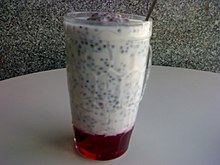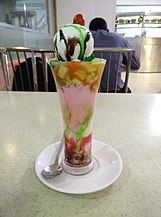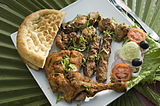 Falooda with kulfi, rose syrup, and basil seeds (sabja seeds) | |
| Type | Drink |
|---|---|
| Course | Beverage |
| Region or state | South Asia, Myanmar |
| Serving temperature | Cold |
| Main ingredients | Milk, rose syrup, vermicelli, sweet basil |
| Similar dishes | Bandung Bombay crush |
A falooda is a Mughalai cold dessert made with vermicelli.[1][2] It has origins in the Persian dish faloodeh, variants of which are found across West, Central, South and Southeast Asia.[3] Traditionally it is made by mixing rose syrup, vermicelli, and sweet basil seeds with milk, often served with ice cream.[4] The vermicelli used for preparing falooda is made from wheat,[5] arrowroot, cornstarch, or sago.[6]
History[edit]
The origin of falooda goes back to Iran (Persia), where a similar dessert, faloodeh, is still popular.[7] The dessert came to late Medieval India with the many Central Asian dynasties that invaded and settled in South Asia in the 16th to 18th century.[7] The present form of falooda was developed in the Mughal Empire and spread with its conquests. The Persianate rulers who succeeded from the Mughals patronized the dessert with their own adaptations, specifically in Hyderabad Deccan and the Carnatic areas of present-day India.[2] This beverage is now a part of Pakistani cuisine, Burmese cuisine, Indian cuisine, Bangladeshi cuisine and Sri Lankan cuisine and is served on weddings and other occasions. In Sri Lanka, Falooda (ෆලුඩා / ஃபலூடா) is often consumed as a popular dairy refereshment.
Metaphorical references[edit]
In idiomatic Hindustani, faluda is sometimes used as a reference to something that has been shredded, which is an allusion to the vermicelli noodles. For example, someone who falls into disrepute might say that his or her izzat has been turned to faluda (Hindi: इज़्ज़त का फ़ालूदा, Urdu: عزت کا فالودہ, romanized: izzat ka faluda), which is roughly equivalent to saying "my reputation is shot".[8]
Variants[edit]
- Some Indian versions consist of translucent wheat-starch noodles, and flavoured syrup.[citation needed]
- In Myanmar, phaluda (ဖာလူဒါ) is made with basil seeds, grass jelly, egg pudding, vanilla ice cream, sweetened milk and rose syrup.[9] More elaborate versions also incorporate sago, rice noodles, fruit jelly, and chopped fruit.
- In southern Bangladesh, falooda is made with pandan extract, pistachios, sago pearls, creamed coconut, mango, milk and vermicelli, and may even include strong black tea.[citation needed]
- Malaysia and Singapore have a similar drink called bandung.
- Thailand has a similar drink, nam maenglak (น้ำแมงลัก), which is made with lemon basil seeds, shredded jelly, tapioca pearls, and Job's tears mixed with sugar, water, and rose water.
- The Iraqi Kurds make a version with thicker vermicelli.[citation needed]
- The Mauritian version is called alouda.
- A variant of known as a "Bombay crush" is popular amongst South African Indians.
See also[edit]
References[edit]
- ^ Marks, Gil (17 November 2010). Encyclopedia of Jewish Food. HMH. ISBN 978-0-544-18631-6 – via Google Books.
- ^ a b "The Royal Falooda". Eating India. Archived from the original on 28 May 2017. Retrieved 4 April 2016.
- ^ Taylor Sen, Colleen (2015). Goldstein, Darra (ed.). The Oxford Companion to Sugar and Sweets. Oxford University Press. p. 357. ISBN 978-0-19-931339-6 – via Google Books.
- ^ "Falooda Recipe". Sailu's Food. 26 May 2015. Retrieved 7 April 2019.
- ^ "Falooda". ifood.tv. Archived from the original on 25 January 2015. Retrieved 26 January 2015.
- ^ "Falooda Sev Recipe". Retrieved 3 January 2017.
- ^ a b Sinaiee, Maryam (10 May 2015). "Faloodeh: Persian Rosewater and Lemon Sorbet". The Persian Fusion. Archived from the original on 12 May 2018. Retrieved 12 June 2017.
- ^ India today, Volume 24, Thomson Living Media India Ltd., 1999,
... Magar this time to izzat ka falooda ban jayega (my reputation will be shot) ...
- ^ Aye, MiMi (13 June 2019). Mandalay: Recipes and Tales from a Burmese Kitchen. Bloomsbury Publishing. ISBN 9781472959485.
External links[edit]
- How To Make Falooda (Indian Dessert Drink) (archived 3 August 2011)







